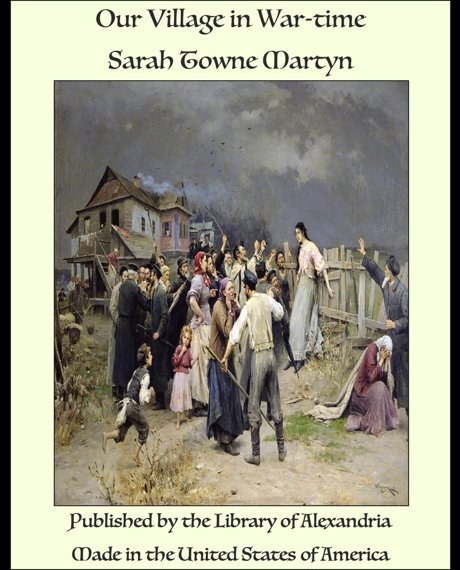Our Village in War-time
Our Village in War-time
€ 4,99
“Would you believe it, Mrs. Glenn, the Tyrrell House is sold, and a family is going to move into it right away? The painters and carpenters have been there for a week. I didn’t know the house, it looked so lively. It seems too bad to have that place shut up from the public, for we all enjoyed it so much; but I suppose the owner had the best right to it, after all. I haven’t found out who the family are, but I shall hear all about it to-morrow, and then I will let you know; for Aunt Prudence is going there to clean the rooms, and get them ready for the furniture.” As Miss Letty paused to take breath, I expressed my interest in the news, which, to confess the truth, had affected me rather unpleasantly. The Tyrrell House was the “show-place” of Beach Hill, a rambling, aristocratic mansion, built by a wealthy Englishman, who, after a series of domestic troubles, shut up the house in disgust, and left the country. It was his wish that no one should reside there; consequently the house was out of repair, and the extensive grounds, laid out originally by a landscape gardener, were overrun with weeds. Still it was a lovely spot, and the dwellers on the hill held annual picnics there, and lovers strolled through its shaded walks by moonlight, and altogether we had come to look upon it as public property, held for our special benefit. Great was our astonishment, therefore, when we heard that the house had been purchased, and was fitting up for a family, who were to take immediate possession. It was felt by us almost as a personal loss; and woe to the new-comers, should they fail to atone by the charms of their society for the deprivation we were to suffer. Not that we were an inhospitable or quarrelsome set of people. On the contrary, we prided ourselves on the possession of the opposite qualities. If there were in the town of Woodbury a model neighborhood, we believed it to be located on Beach Hill. Ours was a very select society, reckoning among its members the clergyman, lawyer, doctor, and editor of the town, and a number of gentlemen of wealth and leisure, as well as some who led the dubious sort of existence called “living by one’s wits.” We assumed, however, no airs of superiority over our townsmen, but were content to manifest our self-complacency by a quietly patronizing manner whenever we met them. In such a community as this, it may be supposed the arrival of a new family was quite an event, particularly as they were about to occupy the best house in the town. The next day I was very busy at home, and had forgotten the coming event, when just at evening Miss Letty made her appearance, every line of her face instinct with news which her tongue was eager to communicate. Miss Letty Brown was the dressmaker par excellence of the town of Woodbury; and though we of the Hill had tried hard to appropriate her, it was found an impossibility, so we were fain to share her services with the inhabitants of the village. She was a cheerful, active little woman, of an uncertain age, with a fresh, breezy atmosphere always about her, which stirred one very pleasantly—a little given to gossip, yet no scandal-monger, but a sincere, earnest Christian, loving God and her fellow-men, and looking persistently on the bright side of every thing. No matter how dark the day, Miss Letty firmly believed in the sunshine behind the clouds, and waited for it to break through. Her services were in constant requisition on every occasion; and as she was brimming over with what the Yankees call “faculty,” nothing that skill and ingenuity could accomplish came amiss to her.
“Would you believe it, Mrs. Glenn, the Tyrrell House is sold, and a family is going to move into it right away? The painters and carpenters have been there for a week. I didn’t know the house, it looked so lively. It seems too bad to have that place shut up from the public, for we all enjoyed it so much; but I suppose the owner had the best right to it, after all. I haven’t found out who the family are, but I shall hear all about it to-morrow, and then I will let you know; for Aunt Prudence is going there to clean the rooms, and get them ready for the furniture.” As Miss Letty paused to take breath, I expressed my interest in the news, which, to confess the truth, had affected me rather unpleasantly. The Tyrrell House was the “show-place” of Beach Hill, a rambling, aristocratic mansion, built by a wealthy Englishman, who, after a series of domestic troubles, shut up the house in disgust, and left the country. It was his wish that no one should reside there; consequently the house was out of repair, and the extensive grounds, laid out originally by a landscape gardener, were overrun with weeds. Still it was a lovely spot, and the dwellers on the hill held annual picnics there, and lovers strolled through its shaded walks by moonlight, and altogether we had come to look upon it as public property, held for our special benefit. Great was our astonishment, therefore, when we heard that the house had been purchased, and was fitting up for a family, who were to take immediate possession. It was felt by us almost as a personal loss; and woe to the new-comers, should they fail to atone by the charms of their society for the deprivation we were to suffer. Not that we were an inhospitable or quarrelsome set of people. On the contrary, we prided ourselves on the possession of the opposite qualities. If there were in the town of Woodbury a model neighborhood, we believed it to be located on Beach Hill. Ours was a very select society, reckoning among its members the clergyman, lawyer, doctor, and editor of the town, and a number of gentlemen of wealth and leisure, as well as some who led the dubious sort of existence called “living by one’s wits.” We assumed, however, no airs of superiority over our townsmen, but were content to manifest our self-complacency by a quietly patronizing manner whenever we met them. In such a community as this, it may be supposed the arrival of a new family was quite an event, particularly as they were about to occupy the best house in the town. The next day I was very busy at home, and had forgotten the coming event, when just at evening Miss Letty made her appearance, every line of her face instinct with news which her tongue was eager to communicate. Miss Letty Brown was the dressmaker par excellence of the town of Woodbury; and though we of the Hill had tried hard to appropriate her, it was found an impossibility, so we were fain to share her services with the inhabitants of the village. She was a cheerful, active little woman, of an uncertain age, with a fresh, breezy atmosphere always about her, which stirred one very pleasantly—a little given to gossip, yet no scandal-monger, but a sincere, earnest Christian, loving God and her fellow-men, and looking persistently on the bright side of every thing. No matter how dark the day, Miss Letty firmly believed in the sunshine behind the clouds, and waited for it to break through. Her services were in constant requisition on every occasion; and as she was brimming over with what the Yankees call “faculty,” nothing that skill and ingenuity could accomplish came amiss to her.
| Prijs | Verzendkosten | Totaal | |
|---|---|---|---|
€ 4,99 | € 0,00 | € 4,99 |
Alternatieve producten
© 2016 - 2024 aanbiedingchecker


/backgroundcolor(255,255,255)/jpg(90)/fetch/https://media.s-bol.com/7llZl8WMDLr/801x1200.jpg)
/backgroundcolor(255,255,255)/jpg(90)/fetch/https://media.s-bol.com/Bz30L9GkVMx/r89J6K6/795x1200.jpg)
/backgroundcolor(255,255,255)/jpg(90)/fetch/https://media.s-bol.com/BBopERyO9gqQ/845x1200.jpg)
/backgroundcolor(255,255,255)/jpg(90)/fetch/https://media.s-bol.com/BljgXQDQ93J/798x1200.jpg)